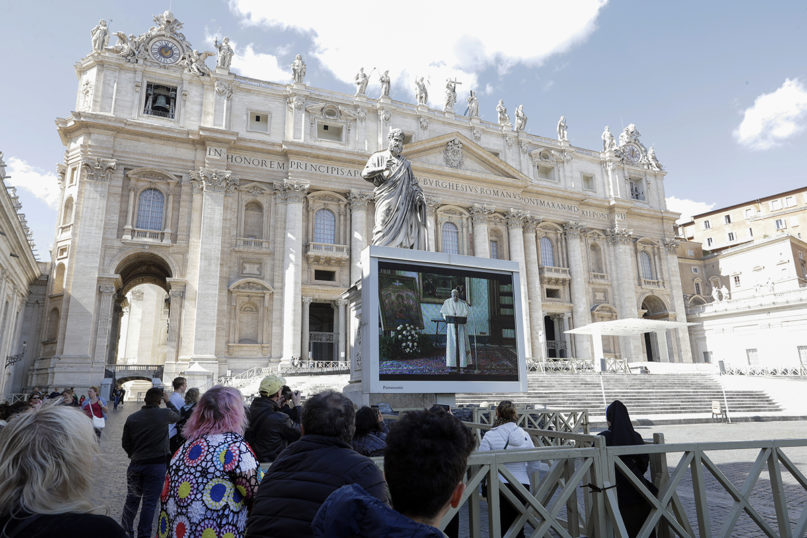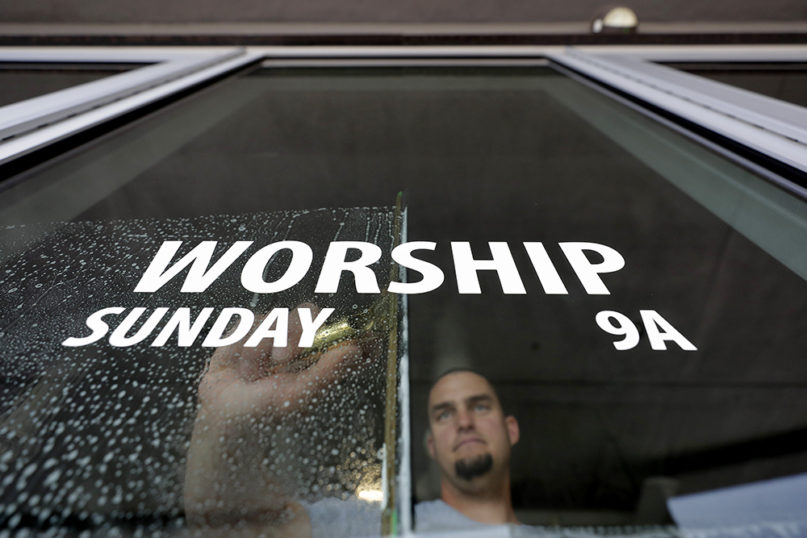(RNS) — The coronavirus outbreak has disrupted day-to-day life for millions. In the U.S., colleges have shut down their campuses, major sporting events — like March Madness, baseball’s spring training, and the entire schedule of NBA games — have been canceled or suspended, major conferences have been scrapped and public schools and businesses are telling people to stay home.
Faith groups are no different. From Washington D.C. to Los Angeles, churches and other houses of worship are shutting down worship services and other religious practices — often at the request of government officials.
Here’s what we know so far:
What’s closed?
- Churches, mosques and Jewish congregations in California are canceling services and events, after California Gov. Gavin Newsom and state health officials on Wednesday (March 11) called for the cancellation of gatherings of 250 people or more.
- Houses of worship in other states — including Kentucky, Ohio, Massachusetts, Maryland, New Jersey, Oregon, Indiana, Michigan, Washington State and New York — are dealing with similar calls to cancel gatherings of more than 250. In some states, such gatherings are officially banned.
- Catholic dioceses in Los Angeles, Cleveland, Chicago, Seattle, Washington, D.C., Newark, Little Rock and Santa Fe have canceled masses. Other dioceses, including all of Pennsylvania, Rhode Island and Ohio, along with cities like Minneapolis, Baltimore, Indianapolis — have given Catholics dispensations for missing Mass.
- The Los Angeles diocese is holding Masses but limiting them to 250 people. “These measures are intended to lessen the risk that we will endanger our people or spread this illness during our worship,” said Archbishop José H. Gomez in a statement.
- The Islamic Center of Southern California canceled all programs through the end of the month. Certain programs will be moved online. “The board of the Islamic Center made this decision out of an abundance of caution and in keeping with Islamic teachings that prioritize public health over religious gatherings,” said Omar Ricci, a spokesman for the Islamic Center of Southern California, in a statement on Thursday.
- Megachurches around the country have decided to cancel in-person services and will stream content online over the weekend. Among them are Willow Creek Community Church in the Chicago suburbs; Saddleback Church and Harvest Christian Fellowship in Southern California; Bethel Church in Northern California; The Summit Church in North Carolina; and Lakewood Church in Houston, where bestselling author and televangelist Joel Osteen is pastor.
- First Baptist Dallas and Prestonwood Church, both prominent Texas megachurches whose pastors have close ties to President Trump, had planned to hold services as of Friday (March 13) to hold in-person services. “How do we avoid what I call the pandemic panic?” Robert Jeffress, the pastor of First Baptist Dallas, told a Texas television station, this week. Prestonwood has since moved services online.
- The Washington National Cathedral — and other Episcopal churches in the Washington, D.C. area will stop worshiping in person for two weeks. The National Cathedral will stream worship online. This Sunday’s preacher will be Presiding Bishop Michael Curry, according to Episcopal News Service.
- The Basilica of the National Shrine of the Immaculate Conception in Washington, D.C., will suspend public Mass.
- Rabbis in Bergen County, New Jersey, closed all Orthodox synagogues and banned small prayer groups known as minyans.
- Trinity Episcopal Church in Fort Worth shut down after a church leader tested positive for the coronavirus, according to published reports.
- The Church of Jesus Christ of Latter-day Saints shut down all worship services worldwide.

This illustration provided by the federal Centers for Disease Control and Prevention in January 2020 shows the 2019 novel coronavirus (2019-nCoV). Image courtesy of CDC
Have other faith-related events been canceled?
The biennial Festival of Faith and Writing at Calvin College was postponed to 2021.
The Religion Communication Congress, which is held once every 10 years, has been canceled.
The African Methodist Episcopal Zion Connectional Lay Council, which was set to draw 500 registrants at a church in Fayetteville, North Carolina, has been canceled.
So far, plans for the Southern Baptist Convention’s annual meeting this June in Orlando remain on schedule. J.D. Greear, the SBC’s president, and other church leaders have called for a day of prayer on Sunday for the COVID-19 crisis.
United Methodist Church bishops have called for the denomination’s General Conference, scheduled for May, to be canceled.
Can faith groups object to a ban on meetings under the First Amendment’s free exercise clause?
Probably not, said Frederick Gedicks, law professor at Brigham Young University Law School.
The free exercise clause doesn’t give faith groups a “presumptive right to an exemption” under the Free Exercise Clause, said Gedicks.
“So as long as the ban on large gatherings applies generally, to everyone, churches cannot complain under the FEC,” he said. “If there were exemptions — say, the ban exempted NCAA tournament games — then the ban would not be generally applicable, and churches and other religious congregations would have a free exercise claim.”
Even if a church had a free exercise claim, the government could argue that a ban on meetings is the least restrictive approach it could take to accomplish a compelling interest in preventing the spread of COVID-19.
So far, no faith groups have announced plans to challenge official bans on group meetings larger than 250 people. However, in Kentucky, where the governor has requested that large group meetings be canceled, some faith leaders say their groups will continue to meet.
The Rev. Stephen Smith of Portland Memorial Missionary Baptist Church told the Louisville Courier-Journal that the church would hold services.
He also said the church’s Lenten fish fries would go on.
“If we tried to shut the fish fry down we’d have a protest in the street,” Smith said. “These people are going to come and get their fish; they’re not thinking about a virus.”
The Archdiocese of Louisville will also keep celebrating masses.

Faithful watch Pope Francis deliver the Angelus prayer on a giant screen to avoid crowds gathering in St. Peter’s Square at the Vatican, Sunday, March 8, 2020. The pope in his streamed remarks said he was close in prayers to those suffering from the coronavirus and to those caring for them. (AP Photo/Andrew Medichini)
What about the Pope and the Vatican?
As of Monday, Italy enacted the harshest measures after China to combat the coronavirus pandemic. The Vatican and churches throughout the country complied with Italian regulations by first abolishing the sign of peace, the use of the baptismal font and standing less than three feet apart, and later by abolishing public masses altogether.
During his morning Mass on Friday (March 13), Pope Francis noted that “drastic measures are not always good.” This was enough to trigger a response from the Vicar of Rome, Angelo De Donatis, to redact his Thursday decree declaring the closure of all Roman churches. Many Italian priests and faithful had objected to the decision via social media.
It will now be up to parish priests to decide whether to have Mass while still following the general indications and precautions to avoid contagion. As of Friday, over 1,000 people have died of the more than 12,000 who contracted the virus in the country. The Papal Almoner, Cardinal Konrad Krajewski, was the first to break the Italian decrees on Friday.
“It is the act of disobedience, yes, I myself put the Blessed Sacrament out and opened my church” of Santa Maria Immacolata in Rome, he told Catholic news outlet Crux. “This is an act that should bring courage to other priests.”





